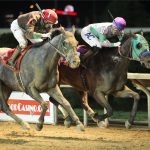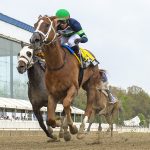For Charlie McIntosh, a long journey to Charles Town
During a career that has spanned nearly 45 years, Charles Town Director of Racing Charles “Charlie” McIntosh has performed a wide variety of tasks within the racing industry and always remained diligent and optimistic about the sport’s future even amid uncertainty.
McIntosh, 69. who took over as Director of Racing at Charles Town in 2019, six years after he had been named the Racing Secretary at the historic Jefferson County oval now celebrating its 90th anniversary, oversees the racing at a track built during the Great Depression.
Charles Town, which hosted its first two $75,000 West Virginia-bred stakes races this month and will offer a third this weekend, currently offers live racing three nights each week with nine races normally presented on each card.
“I think we have been able to maintain a pretty good product here for a while, at least since I’ve been here,” said McIntosh, who became the youngest Racing Secretary in the nation in 1982 when he took over at Latonia [now Turfway Park] at the age of 28.
“We probably have about 1,100 horses on the grounds, and of course that number fluctuates quite a bit over the course of the year. During the winter we’re pretty full since a lot of tracks are shut down, but they’ll be opening up again soon, which is why we’re at three days per week now.”
In addition to becoming the sport’s youngest Racing Secretary during his arrival at Latonia, McIntosh would later take the helm at Birmingham Race Course in Alabama, which presented a number of unique challenges. Not only was parimutuel racing new to much of the South outside of Florida, but it often carded both thoroughbred and greyhound races on the same night.
“Those were some fun times at Birmingham when they had horses and dogs racing there,” McIntosh said, noting that West Virginia is one of the few states in the nation that still offers greyhound races. “We would draw for the thoroughbred races, then we would draw for the dog races and then we would have both of them racing on the same night. At first, it really seemed like it was going to be a circus. But we quickly got the hang of it and we had some good nights with both the dogs and the horses competing on the same cards.”
McIntosh has experienced some of the highs and lows that the sport has to offer racing officials as much as horse owners, although the current trend at Charles Town has certainly been upward. When slots were first introduced to the track and that initial infusion of money inflated purses, field sizes [maxed out at 10 here because of the starting gate and oval circumference] often averaged 9 horses per race.
That number dipped slightly in the previous decade but it has steadily held at around eight horses per race this year and trended upward since live dates went from four to three each week. Meanwhile, parimutuel betting handle has risen steadily in recent years.
“That’s one thing that you have to get used to as a racing secretary,” McIntosh said. “You have to know what you have on the grounds. When I was at Latonia, we probably had twice as many horses there as we do here. So, it was easy to get 12-14 horses in each race and fill an entire card. Obviously, here we can only run 10 but it can get tougher to fill those races when a lot of other tracks are running at the same time. There’s really no mystery to what’s involved when you’re a racing secretary, you have to know what horses you have available when you write the book.”

But what McIntosh has been the most optimistic about the last three years especially has been the expansion of the stakes program. In the past two weekends the track has presented the $75,000 Original Gold for West Virginia-bred fillies and mares and the $75,000 Confucius Say for state-breds, and both events attracted full, competitive fields.
Later this summer the track will offer its signature event, the Grade 2, $1 million Charles Town Classic on the same night that it presents the Grade 3, $750,000 Charles Town Oaks, now the richest sprint race in the country for three-year-old fillies, and three other open stakes worth a combined sum $800,000.
“I think we’re really proud of the stakes program that we have put together here over the last 10-12 years,” McIntosh said. “A lot of that credit has to go to [former Vice President of Racing] Erich Zimny, who always envisioned having races of those type here. Those events, especially when you get horses like Art Collector and Game On Dude and Society that go on to win Grade I races at other tracks, really help put your track on the map. In 2020, because of COVID-19, we put both races on the same night to try and get trainers to send multiple horses for those big races and it’s worked out really well. It really has developed into a tremendous night of racing.”
Zimny, who left Charles Town last August to become assistant general manager of the Hollywood Columbus (OH) casino, called the Classic and later the Oaks the “linchpin” of the Charles Town growth strategy.
“Being the most prominent and preeminent nighttime signal in Thoroughbred racing, that was kind of always the vision and the goal,” Zimny said shortly before he left Charles Town. “One of the things we needed to get there was some tie into the national racing scene, some big-picture event that got people to tune in and recognize it as a track that was more than just 175 days a year.”
Two-time defending Charles Town Classic hero Art Collector won the Grade 1 Woodward at Belmont Park following his initial Classic score in 2021, and earlier this year he won the Grade 1 Pegasus World Cup Invitational at Gulfstream Park, five months after his second Classic triumph. Game On Dude won three Grade I races after taking the Classic, while Society used her victory in the Charles Town Oaks last fall as a springboard to capturing the Grade I Cotillion Stakes at Parx Racing in her next start.
Those follow-up wins in important races provide invaluable publicity for Charles Town, of course. And sometimes they lead to an opportunity to renew acquaintances.
“Having those big races all on one night really puts your track in the spotlight on that night,” McIntosh said. “Fortunately, the last two years Bill Mott has been here to saddle Art Collector and been part of the winners’ circle celebration with him. Even after he got beat at the Fair Grounds in his last start, his owner, Bruce Lunsford, was quoted as saying in one of the racing publications that he already has his old stand-by, the Charles Town Classic, on his radar in the summer. We’d love to have him back here again for a third straight start in the Classic.”
LATEST NEWS















